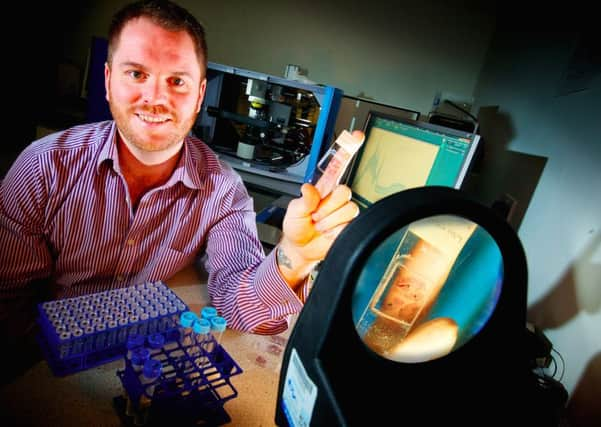Lancashire dad brings new hope for early diagnosis of brain tumours


BRAIN tumour patients visit their doctor more than five times before a diagnosis and around 62 per cent of cases are only diagnosed as an emergency.
Dr Matt Baker, a senior chemistry lecturer, explains: “Unfortunately, brain tumours have the highest average number of years life lost to cancer at 20.1.
Advertisement
Hide AdAdvertisement
Hide Ad“However, it is not the fault of GPs as they may only see one brain tumour in their lifetime. For every person sent for a scan, only one per cent have a brain tumour.
“But there are still more than 5,000 people who lose their lives to brain tumours annually in the UK.”
Dr Baker developed a blood based test for the early diagnosis of brain tumours – research funded by the Rosemere Cancer Foundation.
He is now investigating whether the test can detect chemical changes in the body that can occur in advance of symptoms, enabling doctors to monitor and to treat patients as soon as possible.
Advertisement
Hide AdAdvertisement
Hide AdAs with all cancers, the earlier the intervention, often the better the outcome.
Dr Baker has recently returned from America, where he collected a major international award for his groundbreaking research.
Dr Baker, who lives in Lytham with his wife Frances and children Oscar and Ada, is working on the project with oncologist Dr Ruth Board, based at Rosemere Cancer Centre, the region’s specialist radiotherapy and treatment centre.
Many of the patients Dr Board sees there are skin cancer patients, and it was through her work with them that led to Rosemere Cancer Foundation agreeing to fund the project.
Advertisement
Hide AdAdvertisement
Hide AdSkin cancer is now the UK’s fifth most common cancer. Of patients treated for the disease, up to approximately 20 per cent are at a higher risk of their cancer metastasizing – this means, of developing secondary tumours in other parts of their body.
One of the most common sites for these secondary tumours is in the brain.
Dr Baker explains: “By working to develop a simple blood-based test, the hope for the future is that doctors will be able to identify those at the highest risk of developing a brain tumour so that they can be closely monitored and treated at the first signs of the disease.”
Dr Baker, who grew up in Newton-le-Scales near Preston, was a pupil at Kirkham’s Carr Hill High School and Sixth Form Centre before studying for his degree and doctorate in chemistry at the University of Manchester Institute of Science and Technology (UMIST), and then the University of Manchester.
Advertisement
Hide AdAdvertisement
Hide AdHe has just returned home from Minneapolis where he received his award.
Dr Baker specialises in a branch of chemistry called spectroscopy, which involves testing samples using light.
He was chosen for the award, given by Spectroscopy Magazine at a spectroscopy conference, by a committee of prominent international experts in the field.
They chose Dr Baker as their “Emerging Leader in Molecular Spectroscopy” for his “outstanding research into real-life applications of analytical chemistry”.
Advertisement
Hide AdAdvertisement
Hide AdAs well as collecting his award, Dr Baker gave a lecture on the research project.
Dr Baker now lectures at the University of Strathclyde, but previously worked at Preston’s University of Central Lancashire and before that for the Ministry of Defence in Salisbury following academic posts at Berlin’s famous Robert Koch Institute and Boston’s Harvard University.
He says: “It’s a great honour to be chosen for this award by such a committee of experts.
“There is a need for new diagnostics for cancer and my aim is to translate our spectroscopic technology to help patients.
Advertisement
Hide AdAdvertisement
Hide Ad“So far, we have done a 433-patient study and now we are looking to get funding for a clinical trial.
“I want to thank the Rosemere Cancer Foundation, the Walton Centre and the Sydney Driscoll Foundation for all their support and help with funding.
“I also want to thank all the people who fund-raise for Rosemere. Without the money they raised, this type of research would not be possible.”
Besides funding reseach, Rosemere Cancer Foundation also spends the donations it receives on vital equipment and training that cannot be funded by the NHS as it strives to bring world class cancer treatments and services to cancer patients throughout Lancashire and South Cumbria.
It also funds those things that can make the cancer journey a little more comfortable for sufferers such as free access to complementary therapies for all newly diagnosed patients.